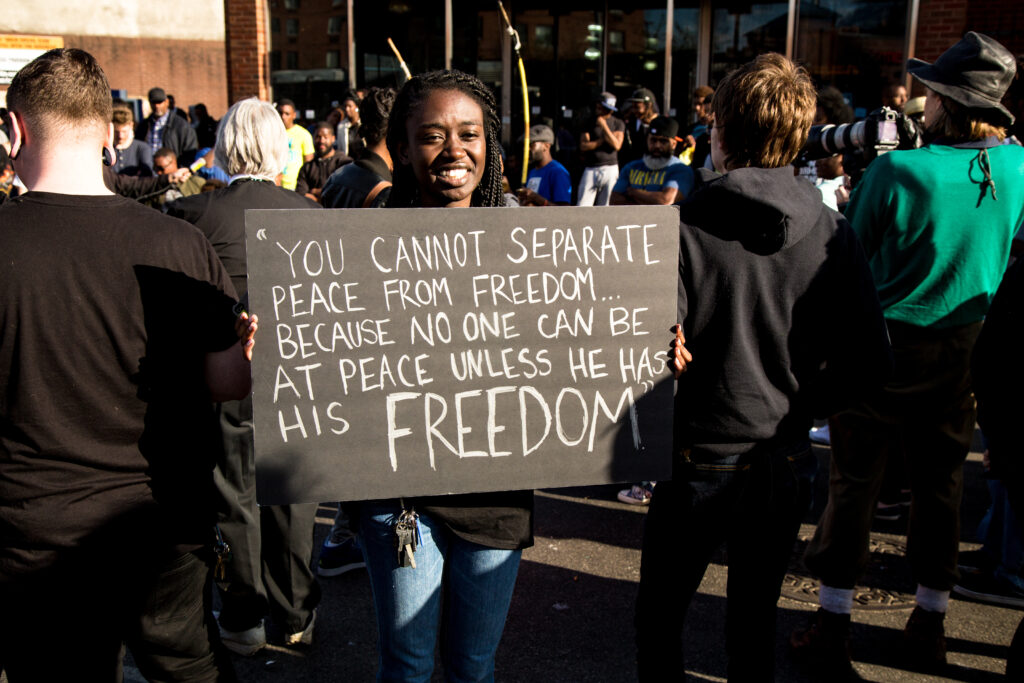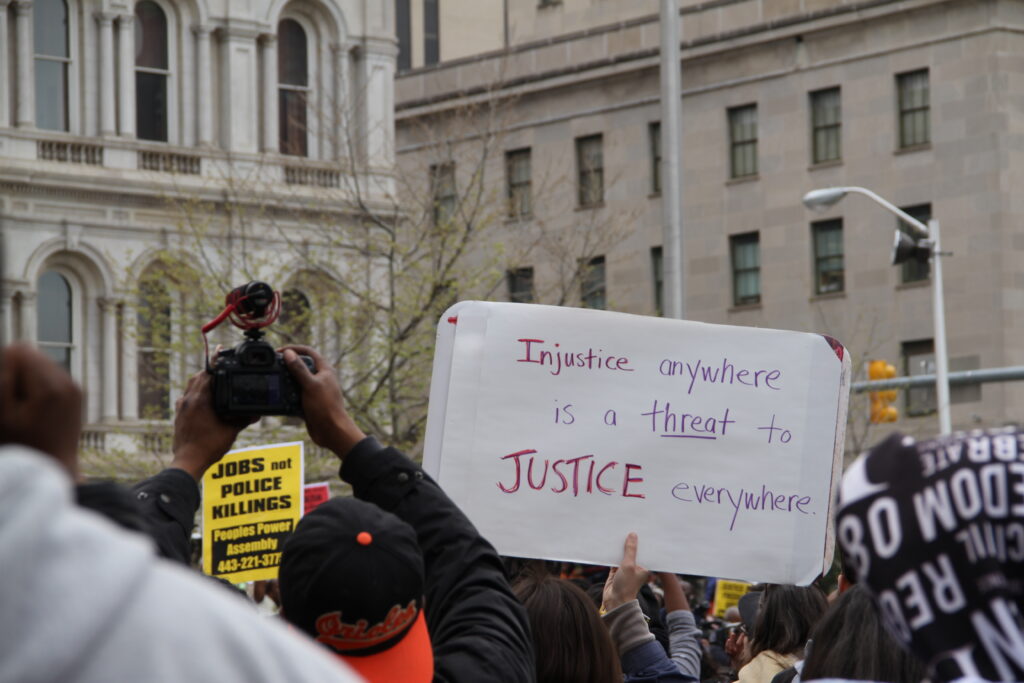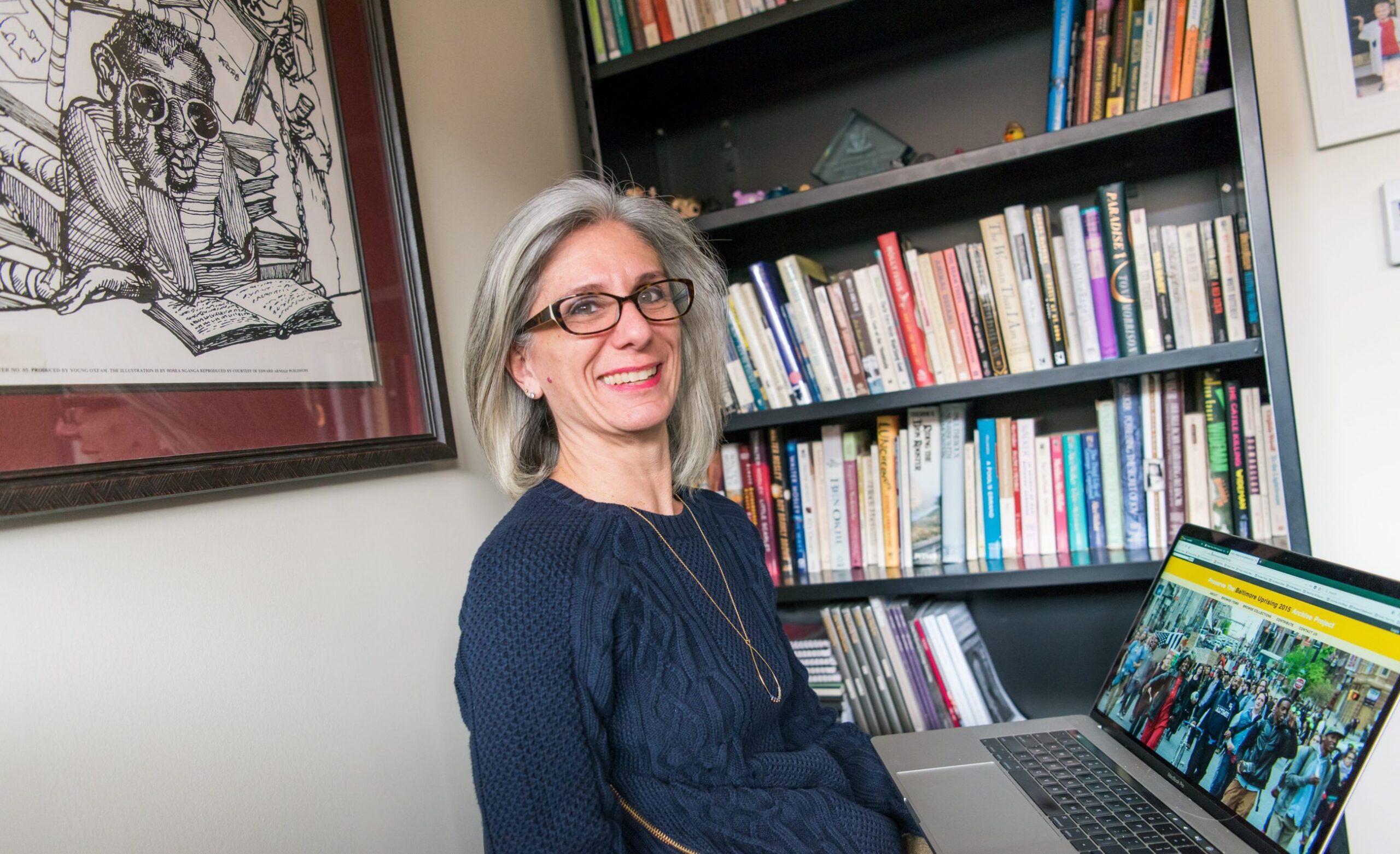Denise Meringolo was teaching her graduate-level Introduction to Public History course in the spring of 2015 when Freddie Gray died in police custody and city residents responded with protest, marching in the streets of Baltimore. The events of that time didn’t just make national headlines, they also sparked difficult conversations in homes, offices, community centers, and classrooms across the city about equality, representation, and safety.
Knowing that history is often told through official documents and representatives, Meringolo, an associate professor of history at UMBC, felt an urgency to help the local community control and document the story of their experience, and she initiated the crowdsourced story and image collection platform BaltimoreUprising2015.org.

“Museums are often not very democratic places,” Meringolo notes, explaining that their collections processes and guidelines often reinforce the voices and experiences of wealthy, white people rather than broader communities in all their diversity. In contrast, the Baltimore Uprising digital collection puts decisions into the hands of the public.
The project offers individuals the opportunity to upload their own materials and decide what they want to become part of the accessible public record. The collection, built and managed in partnership with Joe Tropea, Maryland Historical Society digital projects specialist, now includes 3,000 images, oral histories, and written accounts, and that number continues to grow.

Recognizing the significant potential of this work to have a lasting impact, The Whiting Foundation has awarded Meringolo a $50,000 Public Engagement Fellowship to teach historical understanding through the “Preserve the Baltimore Uprising” project. Meringolo is one of just seven scholars to receive Whiting fellowships in 2018. The recipients represent the diversity of thought and research in the humanities, from history, literature, philosophy, and anthropology to gender studies, and they engage numerous different communities across the United States, particularly groups underrepresented in the humanities.
“The Whiting Fellowship Program is among the nation’s foremost awards for civically engaged research and scholarship,” says Scott Casper, dean of UMBC’s College of Arts, Humanities, and Social Sciences. “Dr. Meringolo’s recognition highlights the importance of her work preserving the archive of the Baltimore Uprising, a signal example of UMBC’s collaboration with communities in greater Baltimore.”
In this next phase of the project, Meringolo seeks to ensure the collection grows and is accessible as a resource for Baltimore City teachers and students. “This is an opportunity to share methods and best practices in conducting oral histories and relevant historical research with the next generation of public historians and their teachers,” she says. Through this work, she hopes to highlight community-based understandings of “the historical roots of racial injustice, economic equality, and social and political unrest in Baltimore.”
Over the next year, Meringolo will collaborate with campus and community partners in this work. As part of the Truth, Racial Healing, and Transformation Centers initiative, Frank Anderson, assistant director of the Choice Program, will lead the UMBC Shriver Center Choice education team in connecting the project with community partners and developing related youth-centered enrichment programs.
Community organizer Denise Griffin Johnson and Lee Boot, director of UMBC’s the Imaging Research Center, will support the initiative in creating story circles programs to guide student scholars in formulating and answering critical questions as they develop their stories. This arts-based component of the project will use materials assembled in the digital collection with and interviews Lee Boot and visual arts graduate students filmed with student protesters after the Baltimore Uprising.
“The work, I believe, will reflect, in particular, the young voices of tomorrow,” says Griffin Johnson. “I believe this action and work is instrumental in capturing the hearts, minds, and voices of people who embrace a community identity of self and others.”
Meringolo’s original collaboration with the Maryland Historical Society will expand to include oral history and interview techniques support by Joe Tropea. Thinking about conservation of the project for future community members, Lindsey Loeper, UMBC special collections archivist, will help the team develop a long-term plan to manage the digital collection.
Meringolo expects to conclude her Whiting Fellowship in a way that carries through her project’s initial vision: doing collaborative public history that honors and amplifies community voices. Participating Baltimore City students will present their research at a neighborhood branch of the Enoch Pratt Free Library.
Ultimately, the project all comes down to the “public” in “public history.” “I want to remind Freddie Gray’s community that the collection exists,” says Meringolo. “That it is theirs.”
Header image: Denise Meringolo. Photo by Marlayna Demond ’11 for UMBC.
Tags: Baltimore City, CAHSS, ChoiceProgram, diversityandinclusion, History, IRC

